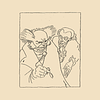Take a photo of a barcode or cover
Unlike many readers of this wafer thin endeavor, I preferred Schopenhauer to the pseudo edge of France’s infamous boy. Houellebecq gives us philosophical marginalia on the philosopher’s writings but not necessarily of an evocative caliber, he balances Schopenhauer with Comte and then makes the result timely by devoting a few lines to splatter film and porn. I’m not sure anyone’s time was well suited by this hiccup of a project.
Embarrassed by this truth, which all by itself ruined his philosophy, Nietzsche tried to ignore it by pleading palpable counter-truths: the poet has always been, he says, essentially driven by the desire to win the prize awarded to the best poet. Bullshit.
Βιβλιάρα, Μισέλ σχολιάζει Σοπενχάουερ, εκτιμάς ακόμα περισσότερο και τους δύο, βιβλίο μαστ για τους εξαρτημένους για Ουέλμπεκ και φιλοσοφία.
Houellebecq's translations and commentary make this text the perfect introduction to Schopenhauer, and perhaps a book which will change many people's lives. I adored every page.
challenging
funny
informative
reflective
slow-paced
Schopenhauer seems to pop up all the time as a reference point for my favorite artists and writers.
I love Schopenhauer,and I love Houellebecq. It came as little surprise to me when I learned that Houellebecq admired Schopenhauer, too. Both are possessed of that rare combination of compassion and a pessimism that can be mistaken for misanthropy.
This is an interesting book, unusual in its format. Houellebecq translates several, sometime quite lengthy, passages from Schopenhauer’s philosophical works, and then provides commentary on each. I can’t say that it changed my own interpretation of the great philosopher, but it felt like a nice warm bath in familiar waters; like reading one more essay on Lou Reed by Brian Eno.
I think I prefer Houellebecq’s appreciation of H.P. Lovecraft, “Against the World, Against Life,”which takes the form of an extended essay, with fewer direct quotes. That book seemed more passionate, and less interpretive or analytical. It also seemed like the French author-critic’s attention was necessary to elevate the American pulp author to capital-L literature, like Baudelaire had done for Poe, and Truffaut had done for Hitchcock in the realm of cinema. That’s not really necessary here.
I will probably come back to this one after reading (and hopefully absorbing) Schopenhauer’s complete works. It seems like its value would increase in direct proportion to one’s familiarity with Schopenhauerian metaphysics.
I love Schopenhauer,and I love Houellebecq. It came as little surprise to me when I learned that Houellebecq admired Schopenhauer, too. Both are possessed of that rare combination of compassion and a pessimism that can be mistaken for misanthropy.
This is an interesting book, unusual in its format. Houellebecq translates several, sometime quite lengthy, passages from Schopenhauer’s philosophical works, and then provides commentary on each. I can’t say that it changed my own interpretation of the great philosopher, but it felt like a nice warm bath in familiar waters; like reading one more essay on Lou Reed by Brian Eno.
I think I prefer Houellebecq’s appreciation of H.P. Lovecraft, “Against the World, Against Life,”which takes the form of an extended essay, with fewer direct quotes. That book seemed more passionate, and less interpretive or analytical. It also seemed like the French author-critic’s attention was necessary to elevate the American pulp author to capital-L literature, like Baudelaire had done for Poe, and Truffaut had done for Hitchcock in the realm of cinema. That’s not really necessary here.
I will probably come back to this one after reading (and hopefully absorbing) Schopenhauer’s complete works. It seems like its value would increase in direct proportion to one’s familiarity with Schopenhauerian metaphysics.
this is barely even a book. just like 50 pages of some Schopenhauer quotes and Houellebecq's brief commentary on them. I remember Schopenhauer was one of the first philosophers I really got in to and reading him in highschool damn near gave me an existential crisis. I remember it was an Easter Sunday I was reading Essays and Aphorisms and got really depressed thinking what's the point of it all if everything is just will and representation. Like a dark side of the Zen Buddhist way of seeing things. Schopenhauer basically got a lot of his ideas from eastern thought but I think reading that stuff made him nihilistic rather than liberated. kinda like how "Nothing matters" can be either a nihilistic or liberating thought.... makes sense that Houellebecq would fuck with this guy
informative
reflective
medium-paced
challenging
informative
inspiring
relaxing
fast-paced
3/7 ★★★☆☆☆☆
challenging
funny
hopeful
informative
inspiring
lighthearted
reflective
fast-paced
Un libercolo davvero insulso questo di Houellebecq, il cui contributo originale, al netto dell'introduzione e dei brani tradotti, si riduce a una trentina di pagine, peraltro mediamente banali quando non del tutto scollegate da quello che dovrebbe essere il loro oggetto.
Una perdita di tempo. E di soldi.
Una perdita di tempo. E di soldi.



